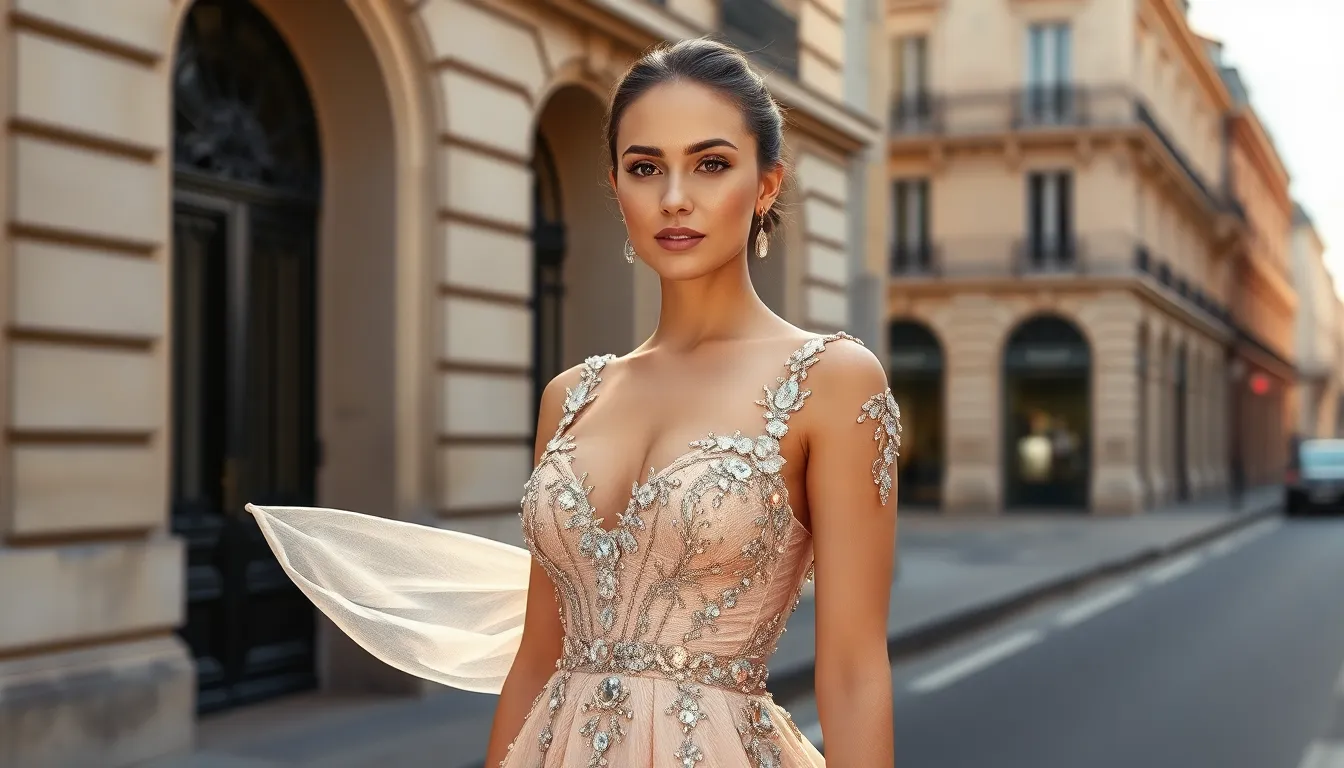Table of Contents
ToggleIn a world where fashion often feels like a never-ending game of “who wore it best,” designer fashion couture stands as the ultimate power move. It’s not just clothing; it’s a statement, a lifestyle, and sometimes a ticket to exclusive soirées where the dress code is “fabulous.” Whether it’s a jaw-dropping gown that makes heads turn or a tailored suit that screams sophistication, couture is all about elevating style to an art form.
But let’s be real—who wouldn’t want to strut down the street feeling like a runway model? With designer couture, every piece tells a story, often at a price that could make your wallet weep. Yet, the allure of wearing something crafted by a master tailor is simply irresistible. Dive into the world of haute couture, where fashion dreams become reality, and discover why investing in a designer piece is like giving your wardrobe a VIP upgrade.
Understanding Designer Fashion Couture
Designer fashion couture represents a unique blend of artistry and fashion, elevating personal style to new heights. Luxury and exclusivity define this realm, attracting those who appreciate master craftsmanship.
Definition and History
Couture refers to exclusive, custom-fitted clothing made by high-end fashion designers. Originating in Paris in the mid-19th century, the term gained significance through designers like Charles Frederick Worth, who is recognized as the father of haute couture. Paris remains the epicenter of couture today, where official regulations govern couturiers, ensuring authenticity and craftsmanship quality.
Key Characteristics
Exclusivity marks couture pieces, making them available to a limited clientele. Customization allows designers to tailor garments to individual measurements, creating unique silhouettes. High-quality fabrics, intricate detailing, and skilled craftsmanship characterize couture items. Unlike ready-to-wear collections, couture pieces often feature elaborate designs and embellishments, reinforcing their status as art forms. Importantly, couture remains timeless, focusing on elegance and sophistication rather than fleeting trends.
The Process of Creating Couture
Creating couture involves a meticulous process that begins with a strong design vision. High-end designers draw inspiration from a variety of sources, including art, architecture, nature, and personal experiences. Each collection reflects the designer’s aesthetic, with themes that resonate emotionally with the audience. Cultural influences often play a significant role, adding depth and uniqueness to the designs.
Design Inspiration
Design inspiration sets the foundation for couture pieces. Designers may look to historical fashion for archival references or explore contemporary movements to inform their creations. Fashion shows and travel experiences also ignite creativity, prompting designers to incorporate vibrant elements into their work. Ideas often evolve through sketches, mood boards, and fabric swatches, underscoring the importance of visualization in the design process.
Fabric Selection and Tailoring
Fabric selection significantly impacts the final garment. Couture designers often choose luxurious materials such as silk, chiffon, and lace, ensuring comfort and elegance. Attention to detail and craftsmanship come into play during tailoring. Each piece is custom-fitted to the client’s measurements, resulting in impeccable silhouettes. Techniques like draping and hand-finishing enhance the uniqueness of each garment, highlighting the artistry involved in couture fashion.
Notable Designer Fashion Couture Brands
Designer fashion couture features a diverse range of brands, showcasing both established icons and emerging talent.
Established Icons
Established icons in the fashion industry set the standard for couture excellence. Houses like Chanel and Dior epitomize timeless elegance, each offering unique designs that resonate with fashion history. Valentino is synonymous with romance and luxurious fabrics. Versace blends boldness with intricate details, attracting attention on runways worldwide. Givenchy, celebrated for its innovative approach, often reflects the balance between classic and contemporary styles. These brands prioritize craftsmanship and quality, ensuring each piece is a stunning representation of haute couture.
Emerging Talent
Emerging talent brings fresh perspectives to designer fashion couture, reshaping the industry. Designers like Jacquemus and Peter Do challenge conventional designs, focusing on innovative cuts and vibrant colors. Marine Serre incorporates sustainability, creating pieces from recycled materials while maintaining chic aesthetics. Other newcomers, such as Christopher John Rogers, capture attention with bold patterns and adventurous silhouettes. Emphasizing individuality, these designers push boundaries and redefine couture for a new generation of fashion enthusiasts.
The Role of Fashion Shows
Fashion shows serve as a dynamic platform for showcasing designer fashion couture. These events highlight creativity and craftsmanship, bringing together designers, models, and fashion enthusiasts.
Haute Couture Week
Haute Couture Week occurs twice yearly in Paris, presenting the pinnacle of luxury fashion. Designers unveil exclusive collections that feature exquisite craftsmanship and premium fabrics. Each show offers insight into the designer’s narrative and aesthetic vision. Prestigious houses like Chanel and Dior typically headline the event, attracting industry insiders, celebrities, and influencers. Attendance requires an invitation, reinforcing the exclusivity of the garments. High-profile attendees often create buzz through their social media presence, amplifying the event’s reach and importance.
Influence on Trends
Fashion shows significantly influence upcoming trends in the fashion industry. Designers set the tone for styles, colors, and silhouettes for the following season. Observing runway presentations enables fashion enthusiasts to identify key trends ahead of the market. Designers often take creative risks, which leads to innovative designs and new concepts. This trendsetting role reinforces couture’s unique place within the broader fashion landscape. Media coverage and online platforms further contribute to the rapid dissemination of these trends, allowing designers to capture the attention of a global audience.
The Future of Designer Fashion Couture
The future of designer fashion couture hinges on two pivotal trends: sustainability and digital innovations.
Sustainability in Couture
Sustainability plays a crucial role in shaping the future of couture. Designers emphasize eco-friendly materials, opting for organic cotton, recycled fabrics, and cruelty-free options. Many luxury brands strive for transparency in their supply chains, ensuring ethical production practices. The incorporation of sustainable methods greatly influences the perception of couture, aligning with consumer demand for responsible fashion. Recent collaborations between designers and environmental organizations highlight this shift, enhancing brand loyalty and attracting eco-conscious consumers. Notable examples include Stella McCartney, recognized for vegan fashion, and Gucci’s commitment to reducing its carbon footprint. Such initiatives not only preserve the artistry of couture but also strengthen the industry’s commitment to the planet.
Digital Innovations
Digital innovations are transforming the couture landscape. Virtual reality and augmented reality allow clients to experience fashion in immersive ways, bridging the gap between the designer and the wearer. Designers utilize digital tools for improved visualization, enabling precise customization of garments. Online platforms facilitate global access to exclusive collections, expanding the reach of couture beyond traditional runways. Brands like Balenciaga and Valentino have embraced digital fashion shows, showcasing collections through live streams to millions worldwide. Social media amplifies the presence of couture, with influencers and celebrities promoting designs instantly. This technology-driven approach modernizes the couture experience while preserving the art form’s authenticity.
Designer fashion couture stands as a testament to creativity and craftsmanship. Its ability to transform individual style into art is unmatched. As trends evolve the commitment to sustainability and digital innovation reshapes the couture landscape. Emerging designers are pushing boundaries while established houses continue to set the standard for luxury.
Fashion shows remain pivotal in showcasing these exquisite collections, captivating audiences worldwide. The allure of couture lies not only in its exclusivity but also in its potential to empower individuals. Embracing couture is more than a fashion choice; it’s an investment in timeless elegance and personal expression. The future of couture promises to blend tradition with innovation, ensuring its relevance for generations to come.




